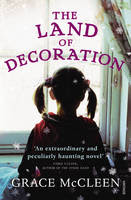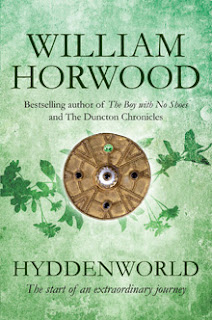One of my favourite books of last year was Among Others by Jo Walton, in which a lonely teenage misfit struggles with her own (self-perceived, at least) ability to perform potentially harmful magic. Grace McCleen's The Land of Decoration has a similar premise in some respects. Narrator Judith, who is bullied and ostracised at school and whose widowed father has brought her up as a member of a fundamentalist Christian sect which appears in all but name to be the Jehovah's Witnesses, is desperate not to go to school and face her tormentor Neil Lewis. On Sunday evening she sprinkles home-made snow over the complex miniature world she has built in her bedroom out of scraps of rubbish. On Monday she awakes to find that a freak October blizzard has all but cut off her home town. And just to prove this isn't mere coincidence, Judith also starts to hear, quite clearly, the voice of God.
The Land of Decoration could easily have been a whimsical, twee novel, with its ten-year-old narrator and her sometimes comic misunderstandings of social interactions and adult hypocrisy. However, while it's beautifully written and almost poetic in places, it's sometimes unsettling, bordering on menacing. Judith's nemesis Neil is far more than a mere school bully, and the manner in which he and his family gradually make life unbearable not just for Judith but also for her father is disturbing for anyone who, like me, finds that kind of insidious, calculated cruelty a deeply uncomfortable subject about which to read. I also found Judith's relationship with her father, widowed the day she was born, desperately sad, and the nature of the voice which Judith believes to be God's is disturbing.
That's not to say that The Land of Decoration is without humour or kindness - far from it. It has many touching moments and Judith is an entertaining and observant narrator with genuine charm and a perspective which is convincing for a bright ten-year-old with an unconventional upbringing. Sheltered from ordinary childhood entertainments like television and fun-fairs, she's also exposed to terrifying sermons about Armageddon and the wrath of God and almost entirely without friends of her own age, so as a character she presents us with an interesting mix of innocence and precociousness which is unnerving and comic by turns. A child's point of view is, of course, highly effective for writers who want to highlight the absurdities inherent in certain types of adult behaviour, and while Judith is sometimes confused, there are also moments when she is sharply perceptive.
The Land of Decoration is a book that I struggled to put down, and one that will stay with me for a long time. Ultimately, I found it uplifting. Some might find it less so - I have no idea how someone with a strong religious faith might feel about about some aspects of the book's conclusion, for instance - but for me, this was an oddly life-affirming read, and a well-crafted one too.



